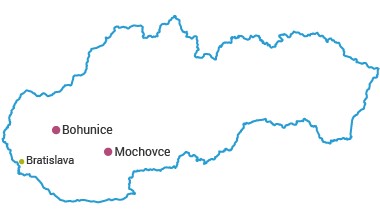The Bure Underground Research Laboratory welcomes a Slovakian delegation
On Wednesday, May 10, the CMHM welcomed a Slovakian delegation composed of Peter Gerhart, Secretary of State at the Ministry of the Economy, Igor Slobodník, Ambassador of the Slovak Republic to France, and several key players of the nuclear industry, including Pavol Štuller, the General Manager of JAVYS, the national waste management operator.

The program for the day included a welcome coffee, a presentation of Andra and the Cigéo project by Patrice Torres, Andra Eastern France Director, a visit to the Lab with Sarah Dewonck, deputy-head of the Underground Research laboratoryand then lunch and a session of additional discussions that allowed us to learn more about the nuclear sector in this country.
Slovakia has five nuclear reactors producing half of its electricity and a sixth under construction (Mochovce 4).
Spent fuel is stored for a few years in the reactor pools at the power plant sites, before being transported to a centralized spent fuel storage facility in Bohunice.

Storage of radioactive waste: where does Slovakia stand?
In Slovakia, very low-level radioactive waste (VLLW) and low-level radioactive waste (LLW) are disposed of in Mochovce (the national radioactive waste repository).
Slovakia plans to develop a geological disposal facility for spent fuel and radioactive waste that is not suitable for disposal in the near-surface storage facility. The 2015 National Program also identified key milestones for further development of a deep geological disposal with site selection in 2030 and commissioning in 2065.
Today site investigation studies are focused on five sites, hosted in both clay and granite formations, in the south of the country. "We are only at the beginning of a long process," said a member of the delegation.
At the same time, Slovakia is engaged in discussions on the creation of a regional (multinational) deep geological repository, together with other European countries, which will have to manage a small to modest inventory of spent fuel, to share the large investment costs.




